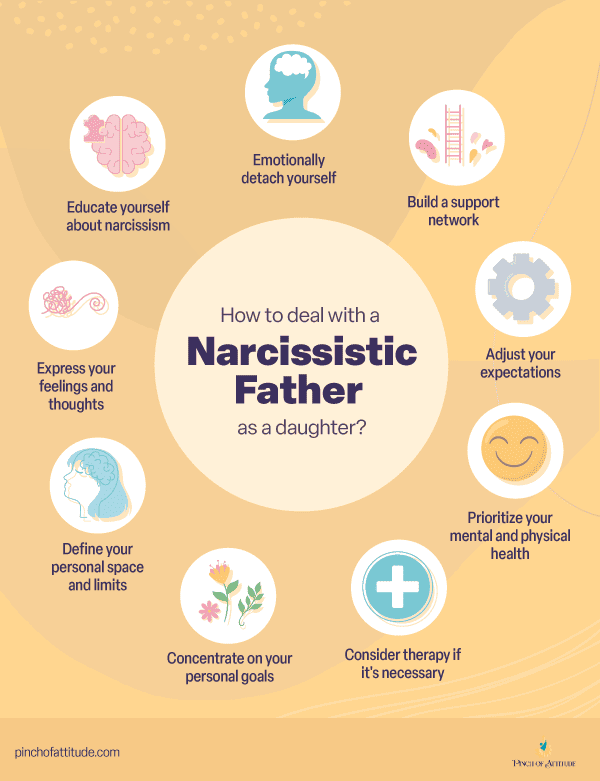For some, the term “daddy dearest” doesn’t always paint the rosiest picture.
Being raised by a narcissistic parent who prioritizes their reflection over their feelings can leave daughters feeling like a supporting act in their grand drama.
I get it. I was the queen of the scapegoat parade for years, dancing to my narc mom’s ever-changing tune. But guess what? I’m not stuck in that spotlight anymore.
Those fights that felt like you were starring in a one-man play, the silent treatments thicker than pea soup, and the guilt trips that could win an Oscar? I was able to survive it all.
So, if you’re wondering how to deal with narcissistic father-and-daughter relationships, I’ve got tips and tricks to share with you.
Yes, it won’t be easy, but trust me, it’s worth every step.
- Setting boundaries with a narcissistic father is not about punishing him. It’s a necessary step to protect your emotional space.
- You get to decide who crosses the emotional line and how close they get. Surround yourself with people who understand and see you for who you are.
- Healing won’t change your dad, but it will change you. There will be stumbles, but with therapy and the right mindset, you’ll get there.
Table of Contents
How to Deal With a Narcissistic Father as a Daughter?

You’ve survived the emotional circus of childhood with a narcissistic dad. But now, you’re an adult facing a different kind of challenge.
Navigating this dynamic as an independent woman requires a new set of tools.
Remember, you’re not powerless. Here are some practical tips on how to deal with a narcissistic father as an adult daughter:
Define Your Personal Space and Limits
Did you ever hide under the covers, wishing to escape the reality of growing up with a narcissistic dad? We’ve all been there, haven’t we?
But now, as adults, we get to be the architects of our safe havens. That means setting healthy boundaries to protect our precious inner peace.
Think of boundaries like those velvet ropes at VIP events, except instead of champagne flutes, they hold space for your well-being.
This is your life journey, and you get to choose who walks alongside you.
Maybe phone calls get a time limit, visits require advance notice, and certain topics – your love life, career choices, anything he twists into a drama magnet – become off-limits.
Boundaries aren’t walls that cut you off.
They’re fences that let the good stuff in – supportive friends, healthy relationships, hobbies – while keeping out the emotional weeds that choke your happiness.
And yes, sometimes, you have to limit contact with your narcissistic father.
It’s not easy, especially if guilt tries to get into your head. But remember, going no contact doesn’t mean you’re heartless. It means you’re finally choosing yourself.
You’re saying, “My mental health matters, and I deserve a life free from manipulation and drama.”
Tip
Setting boundaries means honoring your right to happiness. Start saying no often and protect your precious space with love for yourself.
Build a Support Network of Friends, Family, or a Therapist

Imagine this: you’re standing on a beach, watching a tidal wave of Dad’s drama roll in.
But instead of bracing for impact alone, you are surrounded by a group of fierce friends, each holding a sturdy surfboard.
That, my dear, is the power of a strong support network.
Growing up in a narcissistic family can leave you feeling isolated, but you weren’t meant to go it alone.
We all need that anchor, that lighthouse in the storm – a tribe of people who understand, who offer emotional support and guidance, and who remind you that you’re not a lone raft in a sea of manipulation.
Lean on trusted friends, those who hold space for your tears and your triumphs.
Talk to family members who see through the smoke and mirrors, the ones who remember the strong, resilient you before the emotional tides rolled in.
And don’t hesitate to invest in a mental health professional. Therapists are trained to disarm negativity and equip you with coping skills.
Remember, you are not responsible for fixing your dad or managing his emotional chaos.
Your job is to take care of yourself, and having a solid support network makes that journey a whole lot smoother.
Prioritize Your Mental and Physical Health
A daughter of a narcissistic father may feel like self-care isn’t a priority, but it should be.
You can look at it as your personal oasis, a chance for you to nurture your mental and physical well-being.
It’s the bubble bath that washes away tension, the quiet walk in nature that soothes your soul, and the nourishing meal that fuels your body and mind.
The emotional toll of growing up with a narcissist may leave you feeling depleted, like a battery running on fumes.
But by investing in self-care, you recharge your spirit, build your resilience, and reconnect with your true sense of self.
Maybe that means saying “no” to draining requests, practicing mindfulness to manage stress, or indulging in creative hobbies that spark joy.
It could be carving out time for regular exercise, prioritizing quality sleep, or seeking professional help to heal past wounds.
Whatever it looks like for you, embrace it. You deserve to feel good in your skin, to experience peace and happiness after years of walking on eggshells.
Educate Yourself About Narcissism
Understanding narcissistic personality disorder or NPD isn’t about diagnosing or blaming. It’s an important part of the healing journey.
It’s like taking off those rose-colored glasses and seeing your dad’s cryptic behavior for what it really is.
Narcissists often struggle with low self-esteem and a constant need for validation, so they crave control to mask their insecurities.
But their manipulative tactics, be it guilt trips, gaslighting, or emotional blackmail, aren’t personal attacks. They are tools to maintain that fragile sense of superiority.
Sure, learning about these patterns won’t change your dad, but it can change you.
It can shed light on why he behaves the way he does, helping you detach from his emotional manipulations.
It can also empower you to set stronger boundaries and prioritize your well-being.
Knowledge is freedom, and by educating yourself, you’re taking back control of the narrative.
You’re no longer a pawn in his emotional game. You’re an informed player, equipped with the tools to manage the relationship.
Tip
Knowledge gives you the power to protect your peace. Read, research, and understand narcissism so you don’t fall for his manipulations.
Adjust Your Expectations From Your Father
Daughters of narcissistic fathers may have to confront a reality that stings – your dad can’t give you what he doesn’t have.
Yes, his lack of empathy, his struggles with emotional intimacy, and how he prioritizes his own needs above all else – all these narcissistic traits are not your fault.
But it’s up to you to acknowledge the truth.
Trying to mold him into the father you crave is like pouring water into a sieve: it’s futile and frustrating.
So, let go of the fantasy of the Hallmark dad and focus on what’s possible.
Maybe your relationship can be civil. Perhaps it needs more distance, with occasional check-ins but minimal emotional investment.
It’s okay to validate your own needs and prioritize your well-being, even if that means accepting a less-than-ideal relationship with your father.
And hey, this doesn’t mean you condone his behavior or erase the hurt he caused. You’re simply protecting yourself from further disappointment and emotional drain.
Express Your Feelings and Thoughts Clearly and Calmly
Ever feel like a walking emotional sponge, soaking up your dad’s negativity and squeezing it out in tears and frustration?
The effects of being raised by a narcissistic father can leave daughters masters of bottling things up.
But as a daughter of a narcissist mom myself, I learned that bottling up your feelings is like holding your breath underwater – it’s unsustainable, and ultimately harmful.
So I worked hard to change my ways.
In my experience, I see it like learning a new language – the language of emotional honesty.
I began journaling my thoughts and feelings and practicing assertive communication with trusted friends.
At the same time, I also sought help from a therapist who guided me through expressing myself healthily and productively.
Plus, learning to express yourself clearly and calmly isn’t just about your relationship with your narcissistic father. It’s about your ability to maintain healthy relationships with others.
It’s the foundation of trust, intimacy, and genuine connection – things you deserve to experience.
Tip
To claim your truth, you first have to free your voice. Share your story, and don’t be afraid to be vulnerable with the right people.
Emotionally Detach Yourself to Protect Your Well-Being
Despite what others may say, detaching emotionally from a narcissistic family member doesn’t mean you are cold or heartless.
It just means you are choosing to love yourself enough to set healthy boundaries, even if it stings at first.
Yes, you might feel guilty and hear yourself saying things like, “But he’s my dad,” or I should try harder.”
But remember that healing the wounds of growing up with a narcissistic parent takes some time and a whole lot of self-compassion.
So, take a step back, create space to breathe, and prioritize your own mental and emotional health.
As cliche as it sounds, you can’t pour from an empty cup. Detaching allows you to fill your cup with self-care, healthy relationships, and activities that bring you joy.
Who knows? Maybe in time, with more clarity and resilience, you can approach your dad without getting sucked into his drama and sacrificing your inner peace.
Consider Therapy to Deal With the Emotional Challenges

Survivors of narcissistic abuse often carry the invisible scars of childhood trauma, like emotional baggage you didn’t ask for.
In adulthood, these wounds can manifest in anxiety, depression, low self-esteem, and difficulties in managing relationships.
Therapy can help you navigate the complexities of growing up with a father with narcissistic tendencies.
Techniques like CBT (Cognitive Behavioral Therapy) can provide tools to challenge negative thought patterns and build emotional resilience.
In turn, you can learn to set healthy boundaries, communicate effectively, and prioritize self-care.
Seeking therapy isn’t a sign of weakness. Rather, it’s more about taking control of your well-being and choosing to heal from the past.
Just like you wouldn’t navigate a stormy sea without a compass, you shouldn’t navigate the emotional aftermath of narcissistic abuse without professional support.
Tip
There’s no shame in seeking professional help. Invest in your well-being by connecting with a therapist to help you heal past wounds.
Concentrate on Your Personal Goals and Aspirations
Daughters of narcissistic fathers often get caught in the crossfire of their dads’ sense of entitlement and inflated expectations.
Suddenly, your artistic soul gets pushed aside for his grandiose visions, leaving you with feelings of inadequacy.
Maybe you were conditioned to dim your light, to fit into the script written by someone else. But you were born with a fire in your belly, a passion waiting to be unleashed.
It’s time to rewrite that script, reclaim your inner author, and pen a story where your dreams take center stage.
No, you’re not trying to forget your past or erase your experiences. You’re acknowledging them, learning from them, and choosing to move forward with purpose.
Children of narcissistic parents often struggle with self-doubt and low self-esteem. But you are capable of anything you set your mind to.
So, focus on your goals, big or small. Celebrate your progress, no matter how incremental. Learn from setbacks, and see them as stepping stones, not walls.
And most importantly, have fun!
Rediscovering your passions should be an exciting adventure, a journey of self-discovery that leads you to a life filled with purpose and fulfillment.
Is It Possible to Heal After Being Parented by a Narcissistic Father?
Yes, it’s absolutely possible to heal after being parented by a narcissistic father. I did with my narcissistic mom’s abuse, so can you.
The journey may be challenging, but with time, effort, and the right support, you can overcome the negative effects of your upbringing and build a healthy, fulfilling life.
I may not fully understand how having a narcissistic father affects daughters, but my own experiences with my mom have taught me invaluable lessons.
I know the sting of having a parent who prioritized their own agenda over your well-being, who used guilt and manipulation instead of genuine connection.
I know the frustration of yearning for a healthy relationship, only to be met with emotional walls and unspoken expectations.
But what I also know is the strength we carry within. And within that strength lies the potential for profound healing.
If I, with my own scars and baggage, could find my way to wholeness, then so can you. You have the strength, the resilience, and the right to claim your sunshine.
Your journey to healing starts with accepting the reality. That’s what I did.
Their personalities are set, their patterns ingrained. Expecting them to bend is like expecting fire to turn into ice – their nature dictates their actions.
So, instead, focus on acceptance, boundaries, and your own path to healing. They might not change, but you can bloom regardless.
Related Posts:
- How to Deal With a Narcissistic Father? It’s Not About Him!
- What Happens to Daughters of Narcissistic Fathers? You Are Not Alone
- Narcissistic Father Jealous of His Daughter: Signs and How I Respond
- Scapegoat Daughter of a Narcissistic Father: My Survival Journey
- How to Heal From a Narcissistic Father: 11 Helpful Ways So You Can Start Right!
Frequently Asked Questions
How do you set boundaries with a narcissistic father without escalating conflicts?
Be clear and firm but not combative. State limits (“I need X,” not “you never”), and enforce consequences calmly.
What are some coping strategies for managing the emotional impact of a narcissistic father’s behavior?
To cope with the trauma of a narcissistic father, practice self-care and seek support therapy. Remember, his narcissistic behavior is about him, not you.
How can you protect your mental health while maintaining a relationship with your narcissistic father?
Protect your mental health by first understanding the signs of manipulation, like guilt trips and gaslighting. Then, set firm and consistent boundaries.
How can daughters of narcissistic fathers build self-esteem and confidence despite their upbringing?
Daughters of narcissistic fathers should focus on reconnecting with their authentic selves and challenging their internalized negativity. Do this by seeking therapy.
What are some effective communication strategies for minimizing conflict with a narcissistic father?
To minimize conflicts with your narcissistic dad, stick to facts, not feelings. Use calm, assertive language, avoid blaming, and stay composed.




